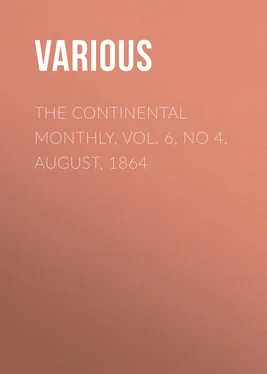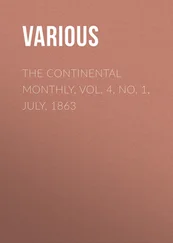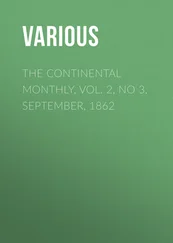Various - The Continental Monthly, Vol. 6, No 4, August, 1864
Здесь есть возможность читать онлайн «Various - The Continental Monthly, Vol. 6, No 4, August, 1864» — ознакомительный отрывок электронной книги совершенно бесплатно, а после прочтения отрывка купить полную версию. В некоторых случаях можно слушать аудио, скачать через торрент в формате fb2 и присутствует краткое содержание. Жанр: foreign_antique, periodic, Языкознание, Политика, foreign_edu, на английском языке. Описание произведения, (предисловие) а так же отзывы посетителей доступны на портале библиотеки ЛибКат.
- Название:The Continental Monthly, Vol. 6, No 4, August, 1864
- Автор:
- Жанр:
- Год:неизвестен
- ISBN:нет данных
- Рейтинг книги:4 / 5. Голосов: 1
-
Избранное:Добавить в избранное
- Отзывы:
-
Ваша оценка:
- 80
- 1
- 2
- 3
- 4
- 5
The Continental Monthly, Vol. 6, No 4, August, 1864: краткое содержание, описание и аннотация
Предлагаем к чтению аннотацию, описание, краткое содержание или предисловие (зависит от того, что написал сам автор книги «The Continental Monthly, Vol. 6, No 4, August, 1864»). Если вы не нашли необходимую информацию о книге — напишите в комментариях, мы постараемся отыскать её.
The Continental Monthly, Vol. 6, No 4, August, 1864 — читать онлайн ознакомительный отрывок
Ниже представлен текст книги, разбитый по страницам. Система сохранения места последней прочитанной страницы, позволяет с удобством читать онлайн бесплатно книгу «The Continental Monthly, Vol. 6, No 4, August, 1864», без необходимости каждый раз заново искать на чём Вы остановились. Поставьте закладку, и сможете в любой момент перейти на страницу, на которой закончили чтение.
Интервал:
Закладка:
We come now to the beginning of the present stage in the development of constitutional government in Prussia. It will have been noticed that the promises of Frederick William III. were not that he would grant a strictly popular constitution. His intention was that the different estates of the realm should be represented in the proposed national diet, the constitution recognizing a difference in the dignity of the different classes of inhabitants, and giving to each a share in the national government proportionate to its dignity. His son, at his coronation, promised to maintain the efficiency of the ordinances of June 5, 1823, and to secure a further development of the principles of this (so-called) constitution. Encouraged by this assurance, the Liberals labored to secure from him the full realization of their hopes. Frederick William IV. was just the man with whom such exertions could be used with good hope of success. He was intelligent enough to be fully conscious of the fact and the significance of the popular request for a constitution, and, though of course personally disinclined to reduce his power to a nullity, he had yet not a strong will, and had no wish to involve himself in a conflict with his subjects. Accordingly, in 1841, he convoked a diet in each province, and proposed the appointment of committees from the estates, who should act as counsel to the king when the provincial diets were not in session. These diets in subsequent sessions discussed the subject of a national diet, and proposed to the king the execution of the order issued in 1815. At length, February 8, 1847, he issued a royal charter, introducing, in fact, what had so often and so long before been promised, a constitution. The substance of the charter was that, as often as the Government should need to contract a loan, or introduce new taxes, or increase existing taxes, the diets of the provinces should be convoked to a national diet; that the committees of the provincial diets (as appointed in 1842) should be henceforth periodically, as one body, convoked; that to the diet, and, when it was not in session, to the committee, should be conveyed the right to have a deciding voice in the above-mentioned cases. April 11, 1847, the diet assembled for the first time; January 17, 1848, the united committee of the estates.
How long the nation would have remained contented with this concession to the request for a national representation under ordinary circumstances, is quite uncertain. In point of fact, this constitution hardly lived long enough to be christened with the name. Early in 1848 the French Revolution startled all Europe—most of all, the monarchs. They knew how inflammable the masses were; they soon saw that the masses were inflamed, and that nothing but the most vigorous measures would secure their thrones from overthrow. Frederick William Was not slow to see the danger, and take steps to guard Prussia against an imitation of the Parisian insurrection. On the 14th of March he issued an order summoning the diet to meet at Berlin on the 27th of April. Four days later he issued another edict ordering the diet to convene still earlier, on the 2d of April. This proclamation is a characteristic document. It was issued on the day of the Berlin revolution. It was an hour of the most critical moment. There was no time for long deliberation, and little hope for the preservation of royalty, unless something decided was done at once. He might have tried the experiment of violently resisting the insurgents; but this was not in accordance with his character. He preferred rather to resign something than to run the risk of losing all. Accordingly he yielded. In this proclamation, after alluding to the occasion of it, he publishes his earnest desire for the union of Germany against the common danger. 'First of all,' he says, 'we desire that Germany be transformed from a confederation of states ( Staatenbund ) to one federal state ( Bundesstaat ).' He proposes a reorganization of the articles of union in which other representatives besides the princes should take part; a common army; freedom of trade; freedom of emigration from one state to another; common weights, measures, and coins; freedom of the press—in short, all that the most enthusiastic advocate of German unity could have asked. At the same time was published a law repealing the censorship of the press. On the 21st of the same month he put forth an address, entitled 'To my people and to the German nation.' In this, after saying that there was no security against the threatening dangers except in the closest union of the German princes and peoples, under one head, he adds: 'I assume to-day this leadership for this time of danger. My people, undismayed by the danger, will not abandon me, and Germany will confidingly attach itself to me. I have to-day adopted the old German colors, and put myself and my people under the venerable banner of the German Empire. Henceforth Prussia passes over into Germany.' But all this was more easily said than done. Whatever the German people may have wished, the other German rulers could not so easily overcome their jealousies. The extreme of the danger passed by, and with it this urgent demand for a united Germany.
But the diet came together. The king laid before it the outline of a constitution, the most important provisions of which were that there should be guaranteed to all the right to hold meetings without first securing consent from the police; civil rights to all, irrespective of religious belief; a national parliament, whose assent should be essential to the making of all laws. These propositions were approved by the diet, which now advised the king to call together a national assembly of delegates, elected by the people, to agree with him upon a constitution. This was done; the assembly met on the 22d of May, and was opened by the king in person. He laid before the delegates the draught of a constitution, which they referred to a committee, by whom it was elaborated, and on the 26th of July reported to the assembly. The deliberation which followed had, by the 9th of November, resulted only in fixing the preamble and the first four articles. At this time an order came to the assembly from the king, requiring the members to adjourn to the 27th, and then come together, not at Berlin, but Brandenburg. The reason of this was that the assembly manifested too much of an inclination to infringe on the royal prerogatives, and that its place of meeting was surrounded by people who sought by threats, and, in some cases, by violence, to intimidate the members. The king was now the less inclined to be, or seem to be, controlled by such terrorism, as the fury of the revolutionary storm was now spent; the militia had been summoned to arms; and had not hesitated to obey the call. The troops, under the lead of Field-Marshal Wrangel, were collected about Berlin. The majority of the National Assembly, which had refused to obey the royal order to adjourn to Brandenburg, and was proceeding independently in the prosecution of its deliberations respecting the constitution, was compelled, by military force, to dissolve. Part of them then went to Brandenburg, and, not succeeding in carrying a motion to adjourn till December 4, went out in a body, leaving the assembly without a quorum. The king now thought himself justified in concluding that nothing was to be hoped from the labors of this body, and therefore, on the 5th of December, dissolved it.
Some kings, under these circumstances, might have been inclined to have nothing more to do with constitution making. If we mistake not, the present king, with his present spirit, would have thought it right to make the turbulent character of the convention and of the masses a pretext for withholding from them the power to stamp their character on the national institutions. Such a course might probably have been pursued. The king had control of the army. The excesses of the Liberals began to produce a reaction. The National Assembly, during its session in Berlin, after it had been adjourned by the king, had resolved that the royal ministry had no right to impose taxes so long as the assembly was unable peaceably to pursue its deliberations, and designed, by giving this resolution the form of a law, to lead the people in this manner to break loose from the Government. This attempt to usurp authority was doomed to be disappointed. The assembly, having overstepped its prerogatives, lost its influence. The king found himself again in possession of the reins of power. It rested with him to punish the temerity of the people by tightening the reins, or on his own authority, without the coöperation of any assembly, to give the nation a constitution. To take the former course he had not the courage, even if he had wished to do so; besides, he doubtless saw clearly enough that, though such a policy might succeed for a time, it would ultimately lead to another outbreak. He had, too, no great confidence in his power to win toward his person the popular favor. With all his talents and amiable traits, he had not the princely faculty of knowing how to inspire the people with a sense of his excellences, and was conscious of this defect. He chose not unnecessarily to increase an estrangement which had already been to him a source of such deep mortification. He therefore issued, on the 5th of December, immediately after dissolving the National Assembly, a constitution substantially the same as that which still exists, with the statement prefixed that it should not go into operation until after being revised. This revision was to be made at the first session of the two chambers, to be elected in accordance with an election law issued on the next day.
Читать дальшеИнтервал:
Закладка:
Похожие книги на «The Continental Monthly, Vol. 6, No 4, August, 1864»
Представляем Вашему вниманию похожие книги на «The Continental Monthly, Vol. 6, No 4, August, 1864» списком для выбора. Мы отобрали схожую по названию и смыслу литературу в надежде предоставить читателям больше вариантов отыскать новые, интересные, ещё непрочитанные произведения.
Обсуждение, отзывы о книге «The Continental Monthly, Vol. 6, No 4, August, 1864» и просто собственные мнения читателей. Оставьте ваши комментарии, напишите, что Вы думаете о произведении, его смысле или главных героях. Укажите что конкретно понравилось, а что нет, и почему Вы так считаете.












